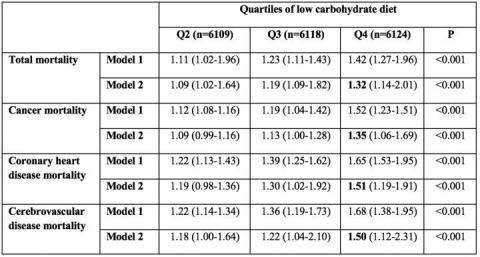The study prospectively examined the relationship between low carbohydrate diets, all-cause death, and deaths from coronary heart disease, cerebrovascular disease (including stroke), and cancer in a nationally representative sample of 24,825 participants of the US National Health and Nutrition Examination Survey (NHANES) during 1999 to 2010.
Compared to participants with the highest carbohydrate consumption, those with the lowest intake had a 32% higher risk of all-cause death over an average 6.4-year follow-up. In addition, risks of death from coronary heart disease, cerebrovascular disease, and cancer were increased by 51%, 50%, and 35%, respectively.
The results were confirmed in a meta-analysis of seven prospective cohort studies with 447,506 participants and an average follow-up 15.6 years, which found 15%, 13%, and 8% increased risks in total, cardiovascular, and cancer mortality with low (compared to high) carbohydrate diets.

Credit: European Society of Cardiology
Participants in the NHANES study had an average age of 47.6 years, and 51% were women. They were divided into quartiles based on the usual percentage of carbohydrates in their diet. The risks of all-cause and cause-specific death over an average 6.4-year follow-up rose with each fall in carbohydrate intake (see table), and remained significant after adjusting for all available factors that might have influenced the association (model 2 in the table).
The researchers also examined the link between all-cause death and low carbohydrate diets for obese (body mass index [BMI] 30 kg/m2 or greater) and non-obese (BMI under 30 kg/m2) participants in two age groups (55 years and older versus under 55) and found that the link was strongest in the non-obese older participants.





Comments